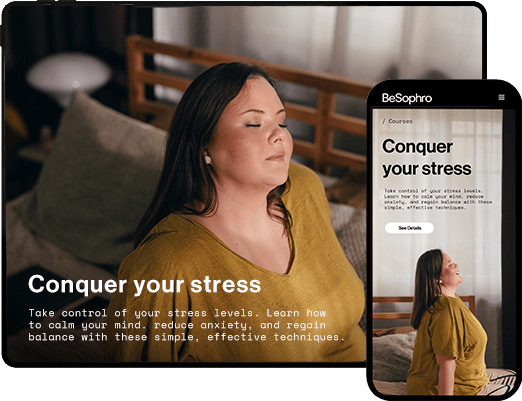Anxiety can be overwhelming, making it hard to focus, sleep, or even enjoy daily life. But while anxiety can feel all-consuming, it’s important to remember that it’s also manageable. The goal isn’t to eliminate anxiety completely - it’s to learn how to stop it from controlling you.
Here are 8 practical steps to help you regain a sense of calm.
Step 1: Identify what’s causing your anxiety
Understanding the root of your anxiety is crucial. Are you stressed about an upcoming event? Worried about the unknown? Or feeling generally uneasy for no clear reason?
Writing down your thoughts or keeping a journal can help pinpoint patterns in your anxiety and make it easier to address.
Step 2: Slow down your breathing
When anxiety kicks in, our breathing often becomes fast and shallow, sending signals to the brain that we are in danger. To counteract this, practice deep belly breathing:
- Inhale through your nose for four seconds.
- Hold your breath for four seconds.
- Exhale slowly through your mouth for six seconds.
- Repeat several times until you feel calmer.
This technique helps activate your body’s relaxation response, reducing anxiety symptoms.
By questioning anxious thoughts, you take away their power
Step 3: Challenge negative thoughts
Anxiety often stems from worst-case scenario thinking. Try to challenge these thoughts by asking yourself:
- Is this thought based on facts or assumptions?
- What’s the best-case scenario?
- How have I handled similar situations before?
By questioning anxious thoughts, you take away their power and replace them with more rational perspectives.

The New BeSophro App
Learn how to control your anxiety
Discover guided Sophology sessions designed to help calm your mind, reduce anxiety, regulate stress and improve sleep.
Step 4: Engage in excercise
Anxiety is not just mental – it’s physical. Moving your body, even for a few minutes, can significantly reduce anxious feelings.
Activities like yoga, stretching, or a brisk walk can help release built-up tension and shift your focus from worry to action.
Step 5: Try a quick mindfulness exercise
Mindfulness can help you stop feeling anxious by bringing your attention back to the present moment. A simple exercise:
- Focus on an object in front of you.
- Observe its colour, texture, and shape.
- Take a deep breath and allow your thoughts to slow down.
This technique helps break the cycle of anxious thinking and brings a sense of calm.
Step 6: Create a “calm ritual”
Having a go-to relaxation ritual can help signal to your brain that it’s time to relax. This could be:
- Listening to calming music
- Practising a body scan meditation
- Sipping herbal tea while focusing on the warmth in your hands
Whatever works for you, make it a habit to turn to this ritual when you start feeling anxious.
If your anxiety feels uncontrollable or interferes with daily life, don’t hesitate to seek support
Step 7: Use visualisation to feel safe and secure
Imagine yourself in a safe, peaceful place – perhaps a cozy room, a sunny beach, or a forest. Picture every detail: the colours, the scents, the sounds.
By mentally transporting yourself to a calming environment, you can help reduce anxious feelings in the moment.

Step 8: Know when to seek help
If your anxiety feels uncontrollable or interferes with daily life, don’t hesitate to seek support.
Talking to a therapist, practicing Cognitive Behavioural Therapy (CBT), or exploring relaxation techniques like Sophrology can make a big difference.
Anxiety doesn’t have to control your life
By using a combination of breathing techniques, mindfulness, movement, and cognitive reframing, you can stop anxious feelings in their tracks and regain a sense of calm. Remember, small daily actions add up – start with one or two of these steps and build from there.
Join thousands already experiencing the benefits of Sophrology – learn to control our anxiety, sleep better, stress less, and wake up ready to face the day. Subscribe to the BeSophro app and find your balance.
BeSophro 1:1
Book a one-to-one session
Book a private Sophrology session with one of our fully qualified Sophrologists to learn practical techniques to manage anxiety, improve emotional resilience, and regain control over your mental well-being.


